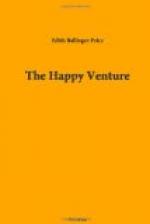“What do you say,” said the Maestro, “to our giving this unsurpassed song to the world at large?”
“Do you mean having it printed?” Felicia asked quickly, “Oh, what fun!” She beamed at Ken, who looked happy and uncomfortable at once.
“I’m afraid I’m too unknown, sir,” he said. “I—I never thought of such a thing.”
“Perhaps,” said the Maestro, with a smile, “the composer is sufficiently well known to make up for the author’s lack of fame.”
Ken’s face grew a shade redder. “Of course,” he stammered. “Oh, I beg your pardon.”
“Then the permission is granted?”
Quite naturally, Ken granted it, with what he thought ill-worded thanks, and the Sturgises walked home across the meadow without knowing on what they trod.
“A real author!” Felicia said. “I told you that wasn’t a pome, when I first heard it.”
But Ken chose to be severe and modest, and frowned on the “Toad Song”—as it was familiarly called—for a topic of conversation. And as weeks slid by, the whole affair was almost forgotten at Applegate Farm.
Those were weeks during which the Maestro, from the shadowy hero of Kirk’s tales, became a very real part of this new life that was slowly settling to a familiar and loved existence. The quiet garden and the still old house became as well known to Ken and Felicia as to their brother, and, indeed, the Maestro might often have been seen in the living-room at Applegate Farm, listening to Kirk’s proud performance on the melodeon, and eating one of Phil’s cookies.
CHAPTER X
VENTURES AND ADVENTURES
Ken had not much time for these visits. The Sturgis Water Line was so popular that he could not even find a spare day or two in which to haul out the Dutchman and give her the “lick of paint” she needed. He had feared that, with the filling of the cottages at the beginning of the season, business would fall off, but so many weekly visitors came and went at the hotels that the Dutchman rarely made a trip entirely empty, and quite often she was forced to leave, till the next time, a little heap of luggage which even her wide cockpit could not carry. Sometimes Ken made an extra trip, which brought him back to the pier at Asquam as the first twilight was gathering.
He had just come in from such an “extra,” one day during the busy Fourth of July weekend, and climbed out upon the wharf when the shadows of the pile-heads stretched darkly up the streetway. Hop fastened the tail-board of his wagon behind the last trunk, rubbed his hands, and said:
“Wife sent ye down some pie. Thought ye desarved it a’ter runnin’ up ‘n’ down all day.”
He produced the pie, wrapped up in a paper, from under the seat, and presented it to Ken with a flourish and a shuffle that were altogether characteristic. Supper was waiting at Applegate Farm, Ken knew, but the pie—which was a cherry one, drippy and delectable—was not to be resisted, after long hours on the water. He bit into it heartily as he left Asquam and swung into Pickery Lane.




